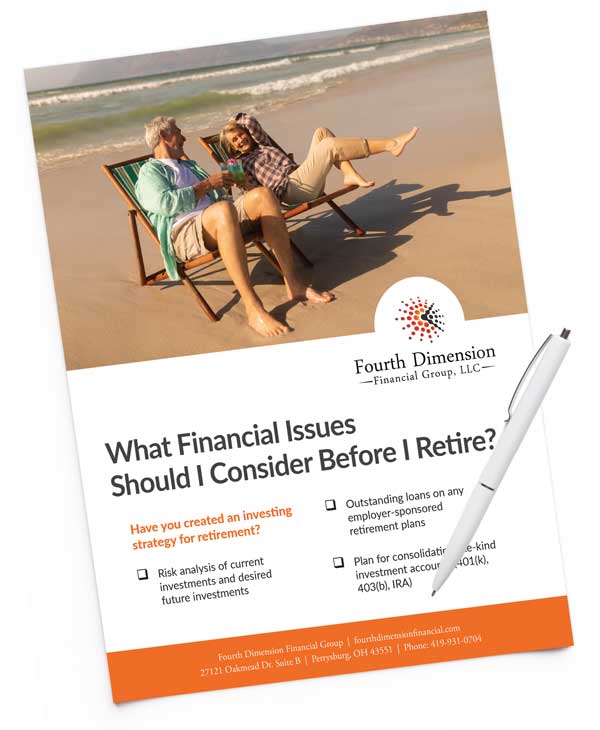
The headlines are screaming, and the data is real: inflation is on the rise.
In fact, we’re seeing higher rates of inflation now than we’ve seen in 40 years. Prices are going up and that can be a very scary reality for retirees. But how does that actually impact you? If you’re retired now or planning to retire soon, what will inflation do to you and how concerned should you be?
First, we have to start by asking what is being inflated and what do you actually spend money on? For if inflation is only impacting the collector art world and you aren’t the art collector type, then we shouldn’t have an issue, right? Well, inflation is having a meaningful effect on food, energy (think gas prices), and healthcare. In other words, this isn’t about art collections, this is real goods and services that real people consume. It’s best to pay attention then, because this is and will continue to matter to you. The question is, how much will it matter?
“If I’m Retired, Should I Change My Plan Because of Inflation?”
As a retiree, there are components of a retirement plan that may very well be affected by continued inflation. Other components, however, may help to battle the inflation on your behalf. How you build your plan then, will help determine how meaningful inflation becomes to you. Let me give an example: if you are fearful of the stock market and placed your entire retirement nest egg into bank CDs, then a fixed rate of interest simply won’t keep up with rising prices. On the other hand, if you’ve placed a reasonable amount of your assets into large company stocks, then those companies are able to pass along those inflationary price increases to consumers which is likely to raise the stock price commensurate, not to mention the dividends they pay you. If you own those company stocks in your IRA, then you can get on the right side of inflation. The best way to manage inflation (or deflation, for that matter) is by allocating money to investments that provide the attributes which you desire.
As retirement income planners, we’re constantly working to measure risk relative to likely reward. And in the case of inflation risk – one of 27 risks that a retiree may face – we know that trying to eliminate all short-term market risk from a portfolio exposes a retiree to other unintended risks like inflation risk. In other words, effective planning is a give-and-take proposition, a process of managing compromises.
As inflation continues, we encourage retirees to confront their fears with data and facts. Two noteworthy data points are these: owning some stocks is the best, most proven way to mitigate inflation risk, and retirees as a population tend to spend less money as they age. That is, even though inflation will continue to be a factor in all of our plans, the natural tendency for aging people is to spend less money over time. So, when inflation causes prices to rise, the fact that retirees gradually spend less money on fewer things means there’s a built-in inflation hedge already. The one category where most retirees do spend more as they age is health care, which may include nursing care. So, a retirement plan should consider these costs in order to hedge the inflation-eroding power to a portfolio. If you enjoy travel, then consider either building those costs into your basic budget in the early active years of retirement, then pair those expenses with guaranteed or certain income sources. Or, some retirees will base their travel on how well their market-based portfolio is performing. When it’s up, travel abroad; when it’s down, travel domestically or locally. Either way, have your priorities built into your plan.
“Can an Annuity Help Me Reduce Risk During Retirement?”
In order to hedge against the risk of over-investing in stocks – that may suffer short-term declines when the market drops – retirees may also consider pairing those stocks with an annuity retirement plan. A retirement annuity plan would include some portion of a retiree’s nest egg placed inside a guaranteed annuity that protects the value of the account from a drop in the markets. And depending on which type of annuity you own, a rise in the market may lead to a rise in the value of the annuity account as well. This type of asset protection can offer a retiree a proven way to stay invested in the stock market with some of their money without taking on the full risk of the market. Said another way, securing a handful of years’ worth of retirement income needs in a protected account allows the non-protected stocks and bonds portion to recover in down years and grow long-term to keep up with or even exceed inflation.
In the end, inflation is real and will continue, even when we don’t know how much of it there will be. The key is to build a plan that incorporates elements that are designed to fight inflation but also to include assets that protect you from a market decline. The balance of such components is what will ultimately determine how your retirement income planning will perform financially. Inflation is real, whether modest amounts or extreme, and isn’t going away anytime soon, so consider how adjustments to your planning may help you navigate the rise in inflation so you can enjoy a reduction in anxiety.
Featured On








Fourth Dimension Financial Group
27121 Oakmead Dr. Suite B
Perrysburg, OH 43551
Phone: 419-931-0704
Email: dave@fourthdimensionfinancial.com






